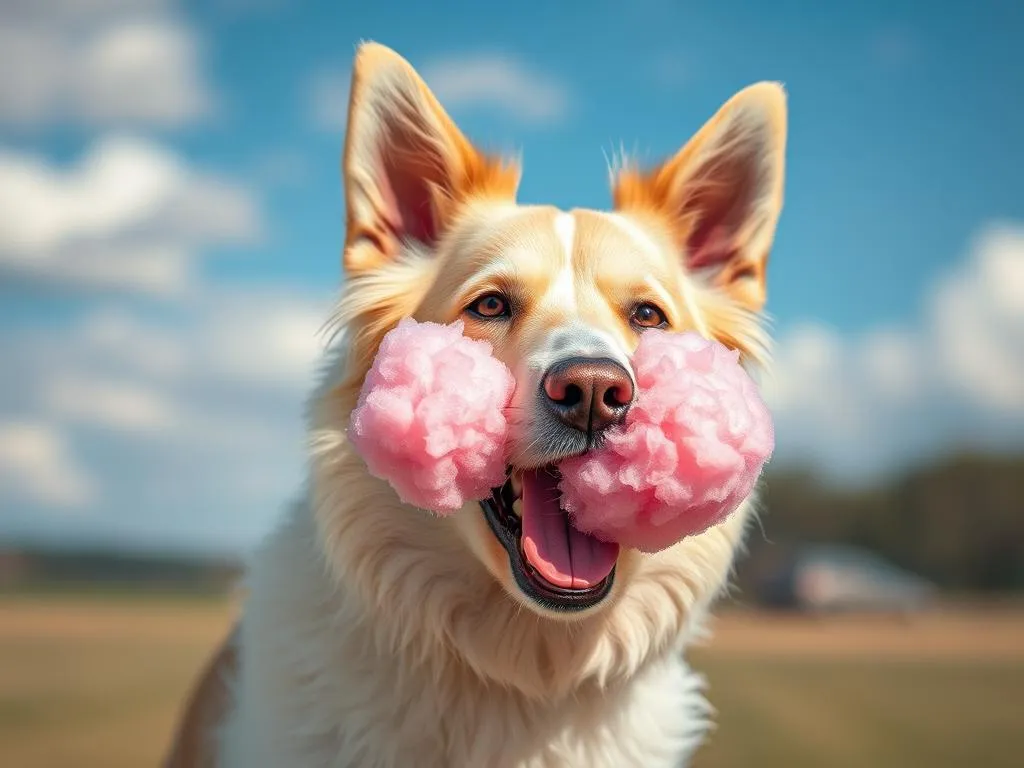
Introduction
Overview of Dog Nutrition
Understanding dog nutrition is pivotal for ensuring the health and longevity of your furry companions. Just like humans, dogs require a balanced diet that provides essential nutrients to support their overall well-being. Proper nutrition not only plays a crucial role in maintaining a healthy weight but also boosts their immune system, promotes a shiny coat, and enhances their energy levels.
In recent years, as pet owners become more adventurous, many are curious about sharing their snacks with their dogs. However, not all human foods are safe for our canine friends. While it might be tempting to share a sweet treat, such as cotton candy, it’s essential to understand the implications of doing so.
Purpose of the Article
This article aims to explore the question: Can dogs eat cotton candy? We will delve into safe and healthy treats for dogs and highlight the importance of making informed choices regarding their diet.
Understanding Dog Dietary Needs
Essential Nutrients for Dogs
Just like us, dogs require a variety of nutrients in their diet:
- Proteins: Essential for growth, maintenance, and repair of tissues. High-quality protein sources include meat, fish, and legumes.
- Carbohydrates: Provide energy and support healthy digestion. Whole grains, such as brown rice and oats, are excellent choices.
- Fats: Important for skin health, brain function, and energy. Look for sources like fish oil and chicken fat.
- Vitamins and Minerals: Necessary for various bodily functions. A balanced dog food typically contains all required vitamins and minerals.
Common Ingredients in Dog Food
Dog food comes in various forms, including dry, wet, and raw. When selecting dog food, reading ingredient labels is crucial. Look for high-quality ingredients that provide the essential nutrients mentioned above. Avoid foods with excessive fillers or artificial additives.
The Role of Treats in a Dog’s Diet
Treats can be a fun way to reinforce good behavior and strengthen the bond between you and your dog. However, it’s essential to strike a balance between meals and treats. Opt for healthy treats such as fruits, vegetables, and specially formulated dog treats that are low in calories and high in nutrients.
The Human Foods Dogs Can and Cannot Eat
Foods Dogs Can Safely Consume
Many human foods can be safely shared with dogs. Here are some examples:
- Fruits: Apples (without seeds), blueberries, and bananas are excellent sources of vitamins and antioxidants.
- Vegetables: Carrots, green beans, and sweet potatoes are not only safe but also provide essential nutrients and fiber.
Hazardous Foods for Dogs
While some human foods are safe, others can be toxic or harmful to dogs. Key foods to avoid include:
- Chocolate: Contains theobromine, which is toxic to dogs.
- Onions and Garlic: Can damage red blood cells and lead to anemia.
- Grapes and Raisins: Known to cause kidney failure in dogs.
- Xylitol and Artificial Sweeteners: Can lead to a rapid insulin release, causing hypoglycemia.
Cotton Candy: A Closer Look
What is Cotton Candy?
Cotton candy is a sugary confection made from sugar that is heated and spun until it forms delicate, fluffy strands. Its primary ingredients are sugar and food coloring, sometimes containing other additives for flavor. The nutritional profile of cotton candy is predominantly sugar, offering little to no nutritional value.
The Safety of Cotton Candy for Dogs
When considering whether dogs can eat cotton candy, it’s vital to assess the implications of sugar consumption. Dogs do not require sugar in their diet, and excessive sugar intake can lead to several health issues:
- Obesity: Increased caloric intake without adequate physical activity can lead to weight gain.
- Dental Issues: Sugar contributes to plaque and tartar buildup, leading to dental problems.
- Diabetes: Frequent consumption of sugary foods can put dogs at risk for insulin resistance and diabetes.
Dogs’ Digestive System and Sugar
Dogs metabolize sugar differently than humans. While they can digest small amounts of sugar, large quantities can lead to gastrointestinal upset, including diarrhea and vomiting. Some dogs may also experience behavioral changes, such as hyperactivity, after consuming sugary foods.
Why Cotton Candy is Not Recommended for Dogs
Short-Term Effects
Feeding your dog cotton candy can lead to immediate reactions. The high sugar content may cause:
- Stomach Upset: As their digestive system struggles to process the excess sugar.
- Hyperactivity: Due to the sudden spike in blood sugar levels.
Long-Term Health Risks
The long-term consequences of feeding dogs cotton candy can be more severe. These include:
- Obesity: Continuous consumption of high-calorie treats can contribute to obesity and related health concerns.
- Impact on Dental Health: Sugar promotes tooth decay and gum disease, leading to painful dental issues.
Alternatives to Cotton Candy
Instead of cotton candy, consider healthier treat options that are safe for dogs. Some recommendations include:
- Homemade Dog Treats: Made with whole ingredients like pumpkin, peanut butter, and oats.
- Commercial Dog-Safe Sweets: Look for treats formulated specifically for dogs, made with natural ingredients and minimal sugar.
How to Encourage Healthy Eating Habits in Dogs
Educating Dog Owners
Understanding dog nutrition is essential for every pet owner. Familiarizing yourself with your dog’s dietary needs, including the dangers of certain human foods, can help you make informed decisions. Resources such as pet nutrition books, online articles, and reputable websites can provide valuable insights.
Creating a Balanced Diet
To ensure your dog receives a balanced diet:
- Portion Control: Measure food portions to avoid overfeeding.
- Meal Planning: Plan meals that include a variety of protein, carbohydrates, and fats. Incorporate healthy treats in moderation.
Consulting with a Veterinarian
For tailored advice on your dog’s nutrition, consulting with a veterinarian is crucial. They can provide insights based on your dog’s specific health needs, weight, and age. Regular check-ups can also help assess your dog’s nutritional status and make necessary adjustments to their diet.
Conclusion
In summary, while the question of can dogs eat cotton candy may seem light-hearted, it raises important considerations about the nutritional needs of our canine companions. Cotton candy, with its high sugar content and minimal nutritional value, poses several health risks for dogs, both in the short and long term.
As responsible pet owners, it’s vital to prioritize a balanced diet and make informed choices about what we share with our furry friends. By focusing on healthy treats and understanding the nutritional needs of dogs, we can ensure they lead happy and healthy lives.
In the end, remember that your dog’s health and well-being depend on the choices you make regarding their diet. Prioritizing their nutritional needs will pave the way for a long, joyful companionship.
References
- List of credible sources for further reading on dog nutrition, pet care, and safe foods for dogs.









